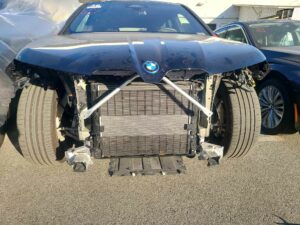
‘Loophole’ in California Repair Act could allow fraud, shop manager says
By Teresa Moss onBusiness Practices | Collision Repair | Legal
Language in the California Automotive Repair Act doesn’t require the owner of a vehicle to authorize repairs, causing possible legal ramifications for the repair industry.
California Code 9880.1 defines a repair customer as the person presenting a motor vehicle for repair and authorizing the repairs to the motor vehicle.
“The Act does not require the customer to be the owner of the vehicle,” Renee Santos, public information officer for California Department of Consumer Affairs, said Wednesday in an email.
Andrew Batenhorst, body shop manager at Pacific BMW, said he learned about the “loophole” in the law when a customer returned a loaner vehicle, which appeared to be in a crash and fixed without notifying the shop.
“Once the vehicle was returned, an employee noticed buffing compound in the cracks of the bumper and notified us at the body shop,” Batenhorst said in a LinkedIn post. “I contacted the insurer involved and found out they approved $25,000 worth of repairs.”
Batenhorst said, upon inspection, his shop discovered the work approved by the insurance company wasn’t completed.
“We found undiagnosed structural damage to the lower frame rails and the ‘supplemental’ repair cost. To redo everything and address the new damage is now over $52,000,” Batenhorst said in the post.
Batenhorst said he contacted BAR and was told the driver was “technically” allowed to authorize the repairs.
The loophole could cause legal ramifications for repair shops, Batenhorst said.
“As a repairer, you have to do the due diligence on who you are talking to,” Batenhorst said. “Who is this person, and what is their relation to the claim and their desired outcome of the claim? If there are disputes between the vehicle owner and the person presenting the repairs, you could be going to court because you didn’t know who was authorizing it.”
Batenhorst said a child could wreck their parent’s vehicle, have it fixed, and never tell their parents. He also said personal assistants could authorize work without their bosses knowing.
“There has to be another layer of protection for you as a business owner,” Batenhorst said.
In Batenhorst’s case, he believes the driver of the loaner pocketed the insurance money in a fraudulent scheme. One, he said, could be happening to other shops that provide loaner vehicles to customers.
“That type of scenario could easily fall through the cracks,” Batenhorst said. “We got lucky that someone saw that something was off.”
The improper repair could have made the vehicle dangerous to drive and the shop could have been held liable later, he said.
Santos said that while law doesn’t define who can repair a vehicle, a contract between a repair shop and consumer could.
Batenhorst said his company will be amending their loaner contract and ensuring customers know they need to return the vehicle for repairs. He suggests other businesses do the same.
Images
Photo courtesy of Andrew Batenhorst
